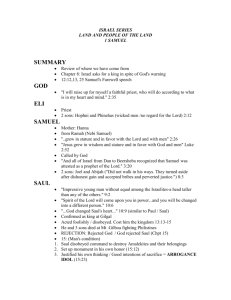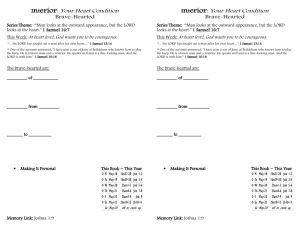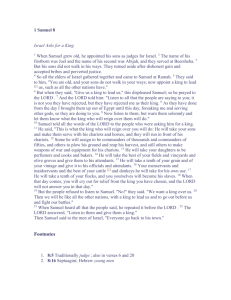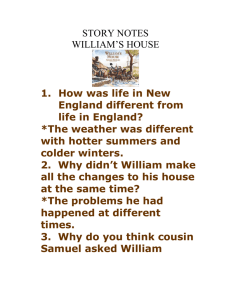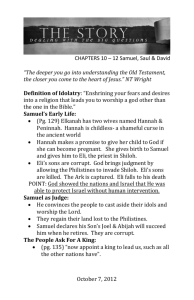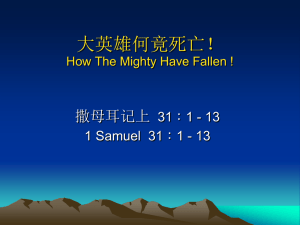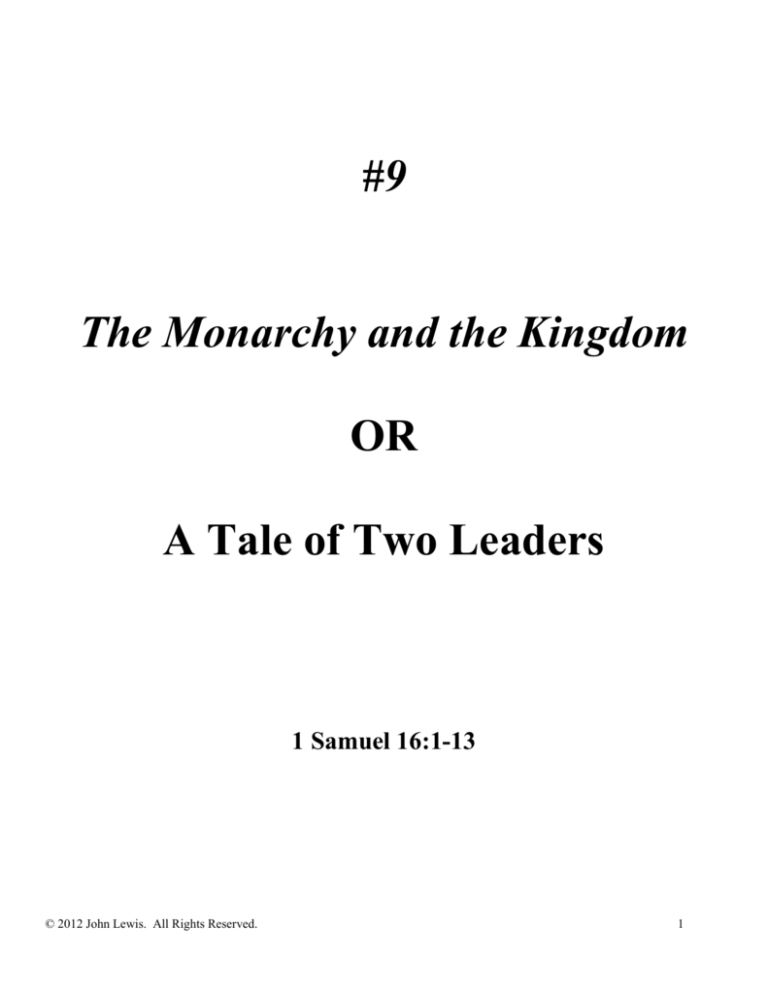
#9
The Monarchy and the Kingdom
OR
A Tale of Two Leaders
1 Samuel 16:1-13
© 2012 John Lewis. All Rights Reserved.
1
#9:
The Monarchy and the Kingdom
INTRODUCTION
Brief Overview of Today’s Story: After Saul’s brief and unsuccessful reign as Israel’s first king, Samuel was now called
to anoint David, Jesse’s youngest son, as Saul’s replacement and a king “after God’s own heart.”
Summary Verse:
But the Lord said to Samuel,
“Do not look on his appearance or on the height of his stature,
because I have rejected him;
for the Lord does not see as mortals see;
they look on the outward appearance,
but the Lord looks on the heart.”
-1 Samuel 16:7
Introduction to Today’s Story and Themes:
After Mt. Sinai, God’s people spent forty years meandering in the wilderness between Egypt and Canaan. When
God used Joshua to lead the next generation into the Promised Land, He was to be their king and leader. Yet the people
fell and wandered again, this time fruitlessly trying to live in the wilderness of their own creation, in the “no man’s land”
between loyalty to Yahweh and to other gods, resulting in lives of chaos. The last sentence of the book of Judges sums it
up nicely: “In those days there was no king in Israel; every person did what was right in their own eyes.” (21:25) Without
consistent leadership, human or divine, the people were destined to live in a miserable cycle of rebellion, retribution,
repentance, and a surface restoration with God.
Having come to the end of their rope, the people asked Samuel, the last judge, for a “secular solution,” a human
safety net and a real live leader whose voice they could hear and whose stature they could admire. “We want a king,
because that is what all the other nations have.” Though they had ratified a covenant of loyalty at Sinai and declared God
to be their supreme king, the common people craved a flesh-and-blood king.
God and Samuel first resisted and then conceded to their request, albeit not without premonitions and warnings.
And thus Israel received a king, two in fact. The first was Saul, and the second, David.
How these two kings were chosen and called, how they began their rule as kings, how these two were similar and
different, matter a great deal in the Biblical story of Israel and in the leadership story of our own cities and organizations.
From the examples of Saul and David come implications for God’s calling on our life, how we are to submit to authority,
and the nature of humility and pride in leadership.
“The book of Judges is a record of revivals. The history of God’s people is one of repeated backsliding, with God
choosing one here, one there, as His instruments to bring recovery. But is this His real purpose for them? Are we today
to expect another revival? Certainly our thoughts turn that way. But God intends something different. God’s eyes are
towards a kingdom. He is planning for a King.”
Watchman Nee
© 2012 John Lewis. All Rights Reserved.
2
SETTING UP THE STORY: An overview of 1st/2nd Samuel
First and Second Samuel provide a history of Israel from the end of the Judges to the last years of David.
Samuel was the connecting link between Judges and the beginning of the monarchy/kings. It is here that we meet David
and discover how he rose to fame. The Old Testament is the story of God’s working with the Hebrew Nation for the
purpose of one day using them to bless all nations. As the story unfolds, it is revealed that through the family of David the
Hebrew nation would bless all nations,
Samuel’s parents were Levites. His mother, Hannah, was barren and prayed desperately for a child. When Samuel
was born, Hannah recognized dedicated him, as she promised, and at 3 years old, he began to serve at the tabernacle.
Samuel “grew in wisdom and stature,” and learned to hear and serve under the high priest, Eli. (1 Sam., ch. 1-2)
Samuel played a prominent role in the change of government from Judges to a king. In the Kingdom of Israel, the
offices of king and priest were separate roles. Samuel was also seen as a prophet. He was the last judge, the first prophet,
and the founder of the monarchy. (Other oral prophets that followed soon after Samuel are Nathan, Ahijah, Elijah, and
Elisha)
Samuel was called by God to be a prophet and priest, and was a conduit to relay the word of God to the people
(3). During the early years of Samuel’s ministry, the Philistines captured the Ark of the Covenant. When the Philistines
suffered several reversals of fortune, they attributed it to their stealing of the ark, so they returned it to Israel. (4-6)
Under the judges of Joel and Abijah, Samuel’s sons, the people of Israel began complaining. They demanded that
Samuel appoint a human king for them. They desired to be like all the other nations. The Lord spoke through Samuel and
warned them what a human king would bring (oppression, slavery, etc.) but the people “refused to listen.” (8) The Lord
granted their request and Saul was anointed as the first king of Israel.
Saul was from the smallest clan of the tribe of Benjamin. He was a strong warrior and stood a “head taller than
any of the others,” yet he hid in the baggage when his time came to be coroneted. After Saul was anointed he defeated the
Ammonites. (9-11) The people followed Saul as their king. But eventually, Saul began to misuse the power of his position
by making sacrifices on his own instead of waiting for Samuel. (13)
Saul became increasingly inconsistent and irrational in his decisions. He ordered a death sentence on his son,
Jonathan, because he disobeyed the ridiculous order for the army to abstain from food. (14) He became a king who was
rash, fearful, and jealous, especially of David. After 42 years of kingship, the Lord rejected Saul as king. “Because you
have rejected God, God has rejected you from being king.” (15) Saul eventually ended his own life, a lonely and jealous
man, a man rejected by God. (31)
David, while still a shepherd and with Saul as king, was anointed to be the next king by Samuel. As a small boy,
David defeated the giant, Goliath, with “only” a slingshot. (17) Saul called David into his household to be a soldier in his
army. This young man had great physical strength, was prudent in speech, courageous on the battlefield, gifted musically
and deeply religious. Thus Saul became jealous of David because the people were fonder of David. Sensing David was a
threat to his power, Saul plotted to kill David. David escaped his ploys every time, though he could have easily killed
Saul. (18-20) Even Saul’s son, Jonathan, helped David escape from his father’s murderous attempts. David and Jonathan
had become very close covenant friends and Jonathan knew that his father was not a sane man. (20) David often showed
that his moral character was superior to Saul’s. Even when he had the opportunity, he refuses to kill Saul and spares his
life; his reverence for Saul as God’s anointed constrained him to submit to this tyrant king at great personal cost. (24)
After the death of Saul, David was anointed king over Judah, and eventually over Israel as well. (2 Sam. 2) In a
special new covenant, God promises David that his throne would go on forever. (7) With this faithful promise from God,
David makes Jerusalem the capital of Israel, moves the ark there, and plans to build the temple. (8-10)
But even a king, a man after God’s own heart, can make tragic mistakes. David commits adultery with Bathsheba
and then directs her husband into the front line of battle so he would be killed. (11) The prophet Nathan confronts David
and his sin as directed by Yahweh. God forgives David, but David must pay for his sin by losing the life of his own son.
(12) David responds with confession and repentance for what he had done. David and Bathsheba later gave birth to a son,
Solomon, who would be the next king. (12) David’s family problems include rape, incest, rebellion, death and murder.
Clearly he was a better warrior than he was a father! The book ends with last words from David (22-23) and a census
taken in disobedience, also a plague sent by God and then reversed as a result of David’s intercession. (24)
“All streams flow to the sea because it is lower than they are. Humility gives it its power. If you want to govern the
people, you must place yourself below them. If you want to lead the people, you must learn how to follow them.”
Lao Tze, Chinese religious philosopher, from the Tao Te Ching,
© 2012 John Lewis. All Rights Reserved.
3
LOOKING AT THE STORY Passage & Words: 1 Samuel 16:1-13
1 The LORD said to Samuel, "How long will you grieve over Saul? I have rejected him from being king over Israel. Fill
your horn with oil and set out; I will send you to Jesse the Bethlehemite, for I have provided for myself a king among his
sons." 2 Samuel said, "How can I go? If Saul hears of it, he will kill me." And the LORD said, "Take a heifer with you,
and say, 'I have come to sacrifice to the LORD.' 3 Invite Jesse to the sacrifice, and I will show you what you shall do; and
you shall anoint for me the one whom I name to you." 4 Samuel did what the LORD commanded, and came to
Bethlehem. The elders of the city came to meet him trembling, and said, "Do you come peaceably?" 5 He said,
"Peaceably; I have come to sacrifice to the LORD; sanctify yourselves and come with me to the sacrifice." And he
sanctified Jesse and his sons and invited them to the sacrifice. 6 When they came, he looked on Eliab and thought, "Surely
the LORD's anointed is now before the LORD." 7 But the LORD said to Samuel, "Do not look on his appearance or on
the height of his stature, because I have rejected him; for the LORD does not see as mortals see; they look on the outward
appearance, but the LORD looks on the heart." 8 Then Jesse called Abinadab, and made him pass before Samuel. He said,
"Neither has the LORD chosen this one." 9 Then Jesse made Shammah pass by. And he said, "Neither has the LORD
chosen this one." 10 Jesse made seven of his sons pass before Samuel, and Samuel said to Jesse, "The LORD has not
chosen any of these." 11 Samuel said to Jesse, "Are all your sons here?" And he said, "There remains yet the youngest, but
he is keeping the sheep." And Samuel said to Jesse, "Send and bring him; for we will not sit down until he comes here."
12 He sent and brought him in. Now he was ruddy, and had beautiful eyes, and was handsome. The LORD said, "Rise and
anoint him; for this is the one." 13 Then Samuel took the horn of oil, and anointed him in the presence of his brothers; and
the spirit of the LORD came mightily upon David from that day forward. Samuel then set out and went to Ramah.
(NRSV)
“Our Christian destiny is, in fact, a great one: but we cannot achieve greatness unless we lose all interest in being great.”
Thomas Merton, No Man is an Island
© 2012 John Lewis. All Rights Reserved.
4
LOOKING AT THE STORY Outline
Write in one or more important observations you want to remember under each section below.
A. 16: 1-4a) “Anoint a son of Jesse.”
B. 16: 4b-v. 5) How Samuel Gets to Jesse/Bethlehem
C
16: 6) “God will choose the likely”
D 16: 7) God: “What God/People look for in a leader”
C’ 16: 8-10) “God does not choose the likely”
B’ 16: 11-12b) How David Gets to Samuel/Bethlehem
A’ 16: 12c-13 “Anoint this son of Jesse.”
What seems to be the flow of the story?
v. 7b: D’ is at the middle of the outline; do you agree that this is the center and the climax of the passage?
Why/why not?
“The voice we should listen to most as we choose a vocation is the voice that we might think we should listen to least, and
that is the voice of our own gladness….I believe that if it is a thing that makes us truly glad, then it is a good thing and it
is our thing and it is the calling voice that we were made to answer with our lives.”
FREDERICK BUECHNER in a graduation address
© 2012 John Lewis. All Rights Reserved.
5
LISTENING TO THE STORY: The following few pages are to be used during the gathering
“Jesus, our Word of Life, use the Feelings, Actions, Thinking, and Speaking (FATS) of the story’s characters to help us
listen to this passage from the Bible with fresh ears. Open our hearts to authentically explore the questions below, the
lesson’s theme, and the implications for our own lives and to those we serve in our community. Spirit, speak to both our
perceptions and misperceptions, to life as it is and as it could be here on earth."
1. THE GOD QUESTION: Share single words or short phrases to summarize some important realities of what God
was like as God related to the different characters of this story.
Which ONE is particularly relevant to your life, to those you serve, or to the last, least, or lost?
2. KINGDOM RELATIONSHIPS: Share single words or short phrases to summarize some important ways that the
story’s characters related, or were supposed to relate to:
God:
Other people in the story:
The created world:
Which ONE is particularly relevant to your life, to those you serve, or to the last, least, or lost?
3. THE BIGGER STORY FIT
A parallel passage or story:
Name one way this parallel passage is similar, and one way it is different from today’s story, and consider what
that might add to the nature of what we have learned today. (See Q#1-2 above.)
4. SUMMARIZE briefly some of the highlights of what we learned and a way God is speaking to you in your
own story:
© 2012 John Lewis. All Rights Reserved.
6
LEANING INTO KINGDOM THEMES
POSSIBLE THEMES:
1. CALLING: Our lives were crafted to do service to God, and we discover that calling from the Voice of our Creator
who speaks through our desires, our burdens, our gifts, our community, scripture, experience and more.
2. Submission to Authority: The willing choice to put our decision making under the direction of another.
3. Humility vs. Pride: Choosing a proper perspective when assessing one’s abilities and gifts - and the actions that
emanate from that choice.
RELATED PRACTICES:
1. Discerning God's Calling: How is it that we move from the questioning to following our sense of His will for our life?
MORE ON CALLING
1. A REAL LIFE EXERCISE:
Introduction - The way things really are: As a group or otherwise, pick a person you serve OR a vulnerable
population in your community.
Describe several real life hardships that make it hard for them to believe their life has a meaningful and
enduring purpose, or that there is a God who might have a special place for them in the world?
Brainstorm a few individual, cultural and institutional factors that help explain how these realities came into
being.
What obstacles are there to serving and coming alongside these folks?
What does their situation and experience have to teach us? How do we face similar struggles?
Implications - The way things could become: Considering what we have learned and experienced in today’s
story, choose, do or delegate from the following:
Imagine: How would knowing God’s calling in the audiences be experienced differently if God
was in charge and if we His people were part of the process?
What changes do you imagine if HE was in charge?
What is one implication and next step that is surfacing here for you or your team to join God’s
efforts to help this population discover their calling and purpose in life?
What resources would be available to you to carry this out, both from within your team and from
those being served?
2. OUR CULTURE AND MY SERVING CONTEXT
Can you think of a prominent leader in your country that began with humble roots and ended up more like
Saul than David? Why?
How does my organization/church encourage submission to authority?
Give one specific example of how your church/organization recruits leaders and helps them with their calling
and developing hearts that reflect God’s values. What would you add to your/their efforts and why?
3. LIFE STORY QUESTIONS (Past and Present)
How have I experienced being called by God in my own past?
Do I have a growing sense of what I am called to be and do? Elaborate.
What positive and negative experiences have I had with submitting to authority?
What areas of my life are easy for me to completely submit to the authority of God and people? Hard?
© 2012 John Lewis. All Rights Reserved.
7
LIVING INTO THE STORY:
Choose from the options below an activity to complete after the gathering. Note:
Be prepared to share briefly in the next class about what you chose to do.
1: REFLECT – in writing (3 parts, and can begin in the class experience)
AUDIENCE SELECTION: Identify and then write the name of the person to whom you will write your
reflection.
WRITING: Identify and then elaborate on one idea, image, theme or character that was particularly relevant to
you in this story/lesson. Write freely and without self critique. Write in a way that is meaningful to you and also
understandable to your chosen audience.(Additional resource: Linking God’s Story to Mine)
SHARING OPTIONS: Email to the class, share with your mentor, send to the letter’s recipient, or a friend.
2: READ – what others have said
GO TO THE WEBSITE: Explore the “Featured Readings” or other resources (articles, poems, quotes, stories,
etc.) available there. Recommended: Click HERE to read the selection from Theirs is the Kingdom, by Robert
Lupton, associated with this lesson.
FIND: Go online or to another source to find an article, blog, or sermon video related to the story or the theme.
Consider sharing it with the class.
3: RESPOND – put faith in action
OBEYING GOD’S VOICE: Trusting that God has spoken to your heart during this week’s lesson, listen and
then commit now to doing a specific action for a person(s) this coming week. Write down the specifics: What,
when, where, etc. (Resource: any part of this lesson and/or ideas from the facilitator)
CREATE: Design a poem, song, artwork, photo, talk outline, small group discussion, or a ministry strategy that
connects to or flows out of today’s lesson, theme or case study.
COMMUNITY ENGAGEMENT IDEA: Interview a community leader regarding the circumstances
leading up to their calling.
“Divine work must be divinely initiated. Whatever the means God uses to make known His will to a man, His must be the
Voice heard through every other voice. While it is true we must never be independent of the other members of the Body,
let us never forget also that it is from the Head that all our direction comes.”
Watchman Nee
© 2012 John Lewis. All Rights Reserved.
8

